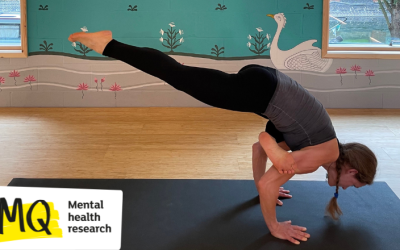As a mental health research charity, we wanted to highlight and celebrate the major breakthroughs in research into anxiety disorder.
We’ve come a long way in understanding, treating and discussing anxiety disorder and related conditions, but further research is still needed. You can support mental health research by supporting MQ and the work we do.
1) Hormones and Anxiety Disorders
Women are twice as likely to develop anxiety disorders as men, but it’s not understood exactly why this is. So, this exciting study from Dr Bronwyn Graham investigated the relationship between hormones and anxiety. Bronwyn wanted to find out if natural variations in hormones make anxiety more likely.
In this amazing breakthrough, Bronwyn found that women with anxiety with low levels of oestrogen were less likely to recover and remain in recovery after receiving treatment. How does this help move treatment forward? If treatment is scheduled when oestrogen levels are at their highest which is during the second week of the menstrual cycle then it could have stronger effects that are more long lasting.
2) Web-based Treatments
Between 2015 to 2019, MQ Researcher Professor Colette Hirsch from King's College London developed an evidence-based intervention for anxiety and depression,
Worry is a symptom of anxiety while rumination, a type of introspection, is one of the major symptoms of depression. Worry and rumination are linked through RNT (Repetitive Negative Thinking) where people’s thoughts are more likely to draw negative conclusions in uncertain outcomes. Colette wanted to develop a treatment targeting that very specific thought process.
Colette’s research confirmed her theory that depression and anxiety have shared causes and that web-based treatment could help reduce these causes. Colette’s work proved the effectiveness of remote, web-focused treatment is revolutionary and holds so much hope for those struggling with anxiety and depression.
3) Accessible Treatment
Dr Michelle Moulds, Professor at the University of New South Wales, and her research have also moved the conversation forward. In a similar time period to Colette’s study (above) Michelle looked into accessible evidence-based treatments for generalised anxiety disorders.
Dr Michelle is interested in the thinking pattern of rumination. The research she is doing could help people affected by not only anxiety disorder but also depression. Rumination is linked to both conditions because it’s a habitual pattern of thinking back over past events, perceived failtures, regrets to a degree that can be damaging and can lead to development of depression and anxiety disorder. She is also asking the question as to whether rumination might be not only a precursor but also a ‘scar’ of previous experiences of mental illness. This might mean that although someone’s symptom improves, this way of thinking stays with them after an instance of mental illness.
Hear more from her about her research.
4) CBT to Treat Panic Disorder
Already a pioneer in research, MQ fellow, Dr Andrea Reinecke, from Oxford University, is working to develop more effective treatments for panic disorder. Using a logical, neuroscience-based approach, her team's work has previously shown that just one session of cognitive-behaviour therapy already has fantastic effects on anxiety.
Now, Andrea’s new study is exploring the theory that one dose of a drug used to treat blood pressure could improve responses to treatment.
There is further research needed into all aspects on anxiety disorders, their causes, preventions, diagnosis and treatments. And since we live in an increasingly anxious world, it’s vital MQ can help researchers continue this vital work.



